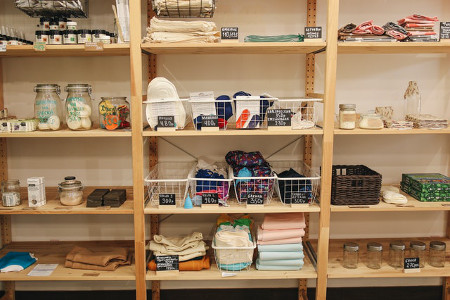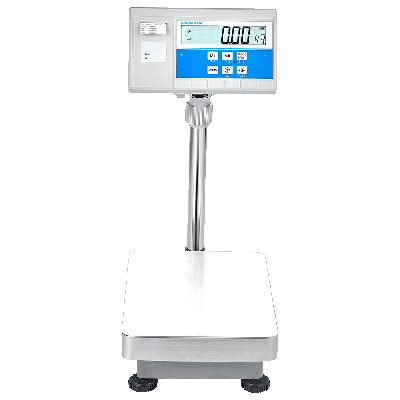
Zero-waste shops originated in Europe, but they’re quickly becoming popular around the world. Consumers and retailers alike are becoming increasingly concerned with sustainability and waste reduction. As new zero-waste stores open and old stores get refitted, it’s helpful to understand not only what zero-waste stores are, but how the right scale can improve sustainability and increase profit margins.
What is a Zero-Waste Shop?
A zero waste-shop sells items without any plastic packaging. Shoppers measure the goods they want to take home and then fill paper bags or reusable containers with a wide variety of items, including grains, produce, cosmetics and much more. Aside from banning plastic bags, zero-waste stores tend to sell organic products, and they usually pay close attention to their supply source to get local and ethically produced items to their customers. Perishable items are donated before the expiration date to reduce waste. Some of these shops are vegan or vegetarian. They tend to have a smaller selection, and customers are unlikely to find products out of season. The shops are designed to help people cut back on the amount of waste they produce.
As the zero waste lifestyle gains popularity, other types of shops are following suits. Gardening centers are cropping to teach people how to garden using their native flora, compost to reduce waste, and of course reduce plastic packaging. Scales can be used to measure fertilizer, compost, special soil, or green pest control solutions.

What Kind of Scales Are Used in Zero-Waste Shops?
Trade-approved scales are a necessity since goods are sold by weight. Different approvals are needed depending on the country of operation, but usually, trade-approved scales show a big “M” label in addition to “OIML”, “EC Type” (in Europe), “ASTM” (in the U.S) or other local organization. Be sure to check local laws to be fully compliant. Our trade-approved scales integrate easily with various POS systems. Don’t forget to check that the system you wish to use is compatible with the scales.
Depending on the area of operation, you might have to register your scale(s) with a local metrology office and get certificates of calibration.
Many people prefer to use digital scales, since they can be easier to read. They also can connect to computers, printer and other peripherals to make inventory management and POS integration easier.
Bench scales should be sufficient for most people’s weighing needs, but a floor scale or even a platform with an indicator could save time during inventory checks and bulk deliveries for big shops. Research the goods you will be selling, and the range of quantities generally purchased by your customers. Most zero-waste cosmetic stores only need low capacity scales, but if people are buying grains in bulk, you must make sure the scale can accommodate them. Don’t forget to include the containers in that calculation! Some customers might use heavy glass jars or metal containers.

Which Features Are Best for Zero-Waste Shop Scales?
A retail scale can cut the middleman by calculating price automatically. They usually have PLUs to store a lot of different products, which is useful for stores with large inventories.
A tare function is also a necessity, especially if customers bring heavy glass or metal containers. If specific containers are frequently used in the store, a preset tare could save time. A bright tare button is always a good idea. Adam scales have color-coded keys with a yellow tare button. If your scale’s keypad does not feature a bright tare key, or if it is faded from use, it might be worth getting a sticker to help it stand out.
If the shop specializes in fresh ingredients and raw products, it could also be a good idea to have a stainless steel weighing pan or even an IP-rated scale to clean quickly and easily between customers. Some scales feature a removable weighing pan to make cleaning easier. That also comes in handy when weighing liquids like soaps, detergents, or syrups.

Checkweighing or checkcounting features may be set with frequently used quantities to save time and help customers get in and out more quickly. This is particularly useful with dry goods such as grains, mulch, rice, cereal, tea leaves, coffee, or flour.
Adam also offers labeling scales and indicators that can print custom sticky labels with logos, bar codes, QR codes, images and more. No need to get a special printer, custom software or cables: the printer is built into the scale’s indicator for convenience. If your shop includes packaged goods, local commercial laws might require specific information on the label, such as product type and quantity. Need help designing your labels? You can buy custom designs.
A counting scale’s display shows price, unit weight and total weight simultaneously, which can make it easier for customers to see how much they pay for their groceries. Some scales feature multiple displays, including one that can be mounted on the rear of the scale or on a pillar for clear results visible to both store personnel and customers.
If the store is outdoors or in an area with limited outlets available (like gardening centers), many Adam scales can function using an internal rechargeable battery. Long battery life can also be helpful if the store has pop-up events, farmer’s markets or local fairs.

Some Tips for Helping Customers Use the Scales
Depending on the number of scales, how many people work in the store and the volume of customers and products, some weighing stations could be self-serve. Be sure to train store personnel for speedy service and to help customers who have questions. Adam scales are designed to be quick and easy to use with minimal training.
Infographics or sheets with instructions can show customers how to use the tare function.
You can also have rollers or sheets that can be attached to scales or label printers with the products and their corresponding PLU numbers if they’re used.
Offering pre-tared containers to customers (either as measuring tools or for them to buy) can also be helpful. You should also offer various scoops and funnels to make sure customers can fill their containers easily with less spills.
If there are alarms or the display changes color when a set limit is reached, the amount of the limits should be clearly indicated near the scale.
Keep cleaning cloths and brushes nearby in case of spills or to wipe the scale between customers.

Adam Equipment and Sustainability
Zero-waste shops are not the only businesses trying to improve sustainability. At Adam Equipment, we believe that companies should do their part and consider how they can reduce their impact on the environment. As such, we have developed several sustainability initiatives that impact our company as well as our suppliers and partners, such as packaging that can be recycled, digital manuals to stop paper waste and a code of conduct outlining ethical and labor standards to protect human rights. Read our sustainability report.
If you need help finding the right scale for your zero-waste shop, let us know! We’ll be happy to help. Already using one of our scales to be more sustainable? Tell us about your experience and get featured in a case study.

